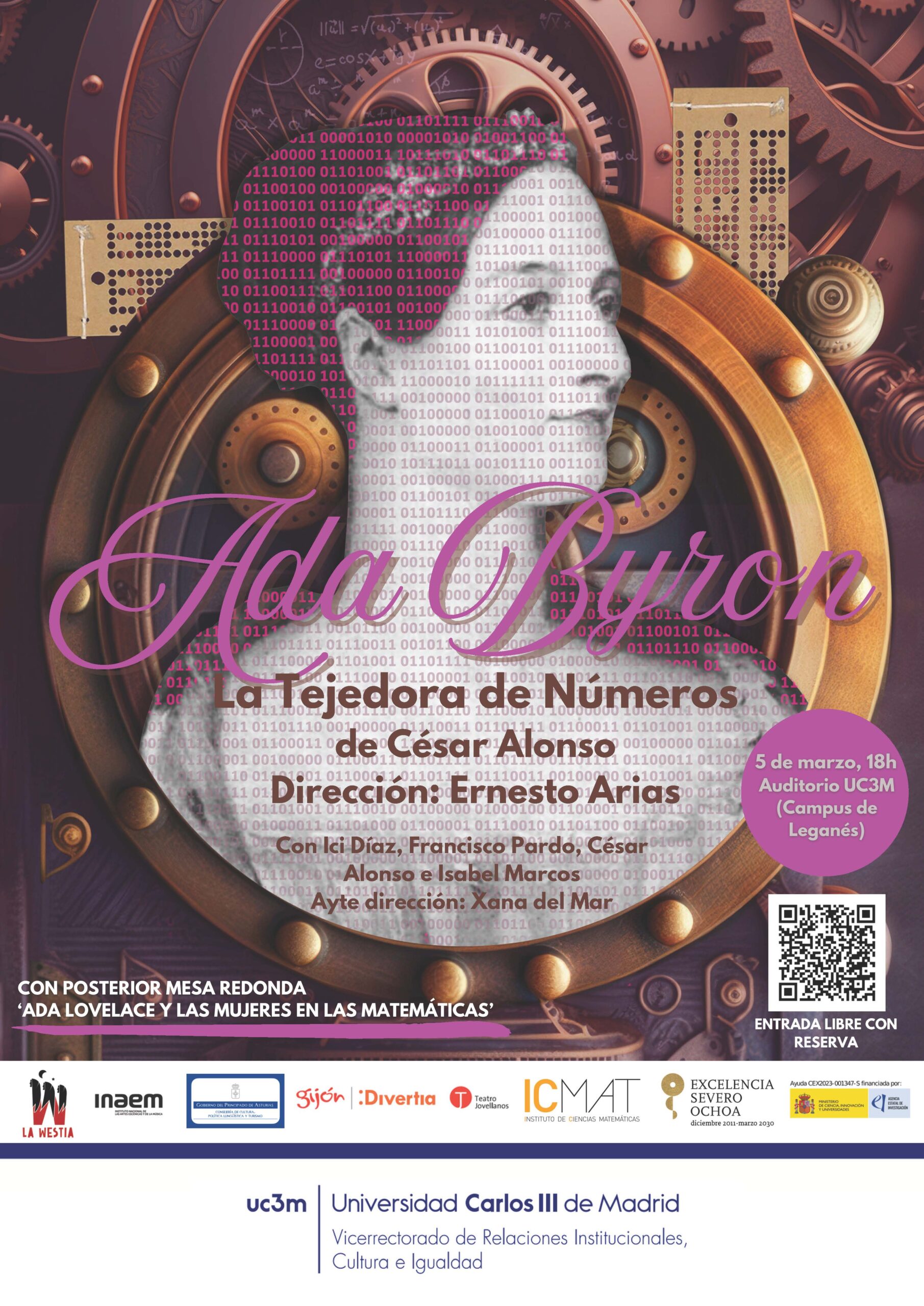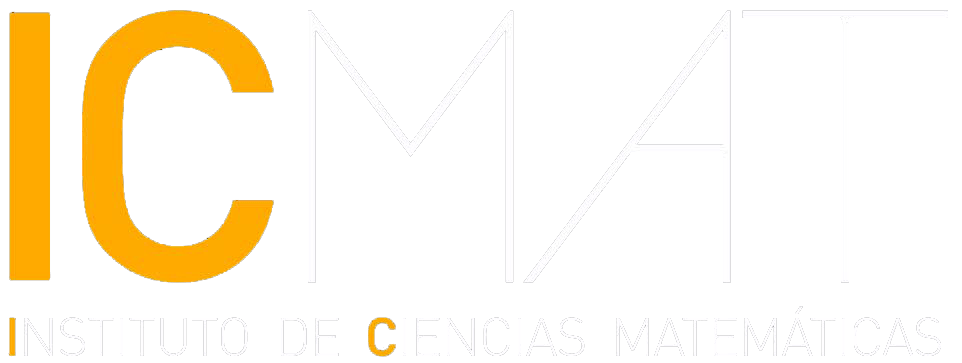Theatre play ‘Ada Byron: The Weaver of Numbers’ and round table ‘Ada Lovelace and Women in Mathematics’
Place: Auditorio Universidad Carlos III de Madrid | Campus de Leganés (C. de Butarque, 15, 28911 Leganés, Madrid, Spain)
Free admission with previous reservation at this link
Organised by: ICMAT and the Carlos III University of Madrid.
Further information
 Ada Lovelace (London, 10 December 1815 – 27 November 1852), also known as Ada Byron because she was the daughter of the poet Lord Byron, is considered the first programmer in history and the mother of computer science. ‘She was a true visionary who predicted, in a way, the era we live in today with computing,’ says César Alonso, playwright, actor, professor at the University of Oviedo and author of Ada Byron: The Weaver of Numbers, adapted for the theatre by the Asturian company La Westia Producciones. This is the first play by the mathematician to be performed in Spain and, among other awards, it has received the Jovellanos Award for Stage Production 2023, and Alonso has recently been selected as a candidate for the Max Award for Best New Playwriting for this text.
Ada Lovelace (London, 10 December 1815 – 27 November 1852), also known as Ada Byron because she was the daughter of the poet Lord Byron, is considered the first programmer in history and the mother of computer science. ‘She was a true visionary who predicted, in a way, the era we live in today with computing,’ says César Alonso, playwright, actor, professor at the University of Oviedo and author of Ada Byron: The Weaver of Numbers, adapted for the theatre by the Asturian company La Westia Producciones. This is the first play by the mathematician to be performed in Spain and, among other awards, it has received the Jovellanos Award for Stage Production 2023, and Alonso has recently been selected as a candidate for the Max Award for Best New Playwriting for this text.
On the occasion of 8 March, International Women’s Day, and 14 March, International Mathematics Day, the ICMAT and the Universidad Carlos III de Madrid (UC3M) are organising a performance of the play in Madrid. The performance will take place on 5 March at 6 p.m. in the Auditorium of the UC3M Leganés Campus and will be presented by Javier Aramayona, director of the ICMAT. Admission is free with prior reservation at the following link.
‘Ada is considered the first programmer in history for having written the first modern algorithms, that is, the first ordered lists of instructions for a calculating machine, in her case, that of the scientist Charles Babbage,’ comments María Isabel González Vasco, professor of Mathematics at UC3M. ‘She was the first to understand that a machine could execute instructions in an ordered manner and not just behave as a static mechanism that limits itself to implementing a practically invariable sequence,’ she continues.
González Vasco and Alonso will participate in the round table discussion ‘Ada Lovelace and women in mathematics’, which will take place after the theatrical performance, in which the evolution of the situation of women in mathematics will be debated. They will be joined by Celeste Campo Vázquez, full professor at UC3M, assistant vice-rector for Promotion at the Vice-Rectorate for Students and coordinator of the STEM4GirlsUC3M project; David Martín de Diego, CSIC scientific researcher at the ICMAT, scientific director of the Mathematical Culture Unit (UCMAT) and member of the ICMAT Equality Commission; and Noa López Fernández, 2nd year student on the UC3M Computer Engineering Degree. Ágata Timón García-Longoria, UCMAT coordinator of the ICMAT, will moderate the discussion.
‘The development we have today has been limited by not having incorporated the vast majority of women researchers throughout history. I can’t imagine the world today, the new technological and scientific advances we would have, if we had had male and female researchers working on an equal footing for centuries,’ says Martín de Diego.
Ada Lovelace
Despite living in the first half of the 19th century, at a time when women were excluded from intellectual pursuits, Lovelace was able, as a child, to study disciplines such as languages and science, especially mathematics. Her mother was convinced that the rationality of mathematics would enable her to control her enormous creativity and imagination, inherited from her father, Lord Byron, who abandoned his family when Lovelace was just a baby.
From a very young age, Lovelace was in contact with important personalities of the enlightened world, such as Charles Dickens, Michael Faraday and Charles Darwin. It was an invention of the mathematician Charles Babbage, whom she met at the age of 18, that captivated her: a numerical calculating machine, called a differential machine, which performed simple numerical calculations. This later evolved into the analytical machine, which they developed theoretically together: it would be steam-powered and, following the loom system of the time, punched cards would give coded instructions to the machine and adapt its calculations according to intermediate results.
Lovelace saw enormous potential in this machine and offered to translate from French into English an article by the mathematician Luigi Menabrea on how it worked. At the end of this translation, she added an appendix, which included the first computational algorithm in history. She herself wrote in one of her letters: ‘No one knows the potential of this powerful system. Someday it may be able to play music, compose symphonies and complex graphic designs. This machine, although theoretical, is considered the origin of the first computers.
‘Lovelace managed to shine with his own light, but we could imagine how far he could have gone if he had not lived in a society with so many prejudices, and this, together with the fact that he died very young, at the age of 36,’ says Martín de Diego.
Ada Byron: The Weaver of Numbers
Ada Byron: The Weaver of Numbers is the first play about the mathematician to be performed in Spain. It is a production by the company La Westia Producciones, directed by Ernesto Arias and text by César Alonso. The cast includes Ici Díaz, Francisco Pardo, César Alonso and Isabel Marcos.
Since its premiere on 23 September 2023, it has been performed in cities such as Alcalá de Henares (Madrid), Santander, Pamplona, Viveiro (Galicia), Haro (La Rioja), Casar de Cáceres and Los Santos de Maimona (Badajoz).
It has received the Jovellanos Award for Stage Production 2023, as well as six awards at the Gala de las Artes Escénicas de Asturias 2024 (show, production, direction, actress, costumes and lighting).
Synopsis
Ada Lovelace is in bed, very ill, and in her delirium she sees her dead father (Lord Byron) with whom she reviews her own life, in which mathematics plays an important role. This review of her life helps father and daughter to get to know each other and brings about revelations and reproaches that change Lovelace’s conception of her existence, and lead her to make a surprising decision.
—
This content has been automatically translated. The original text may differ slightly
